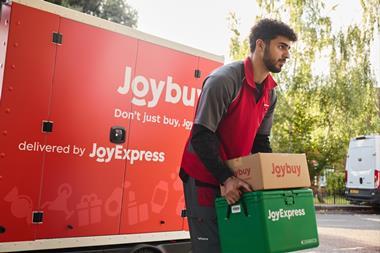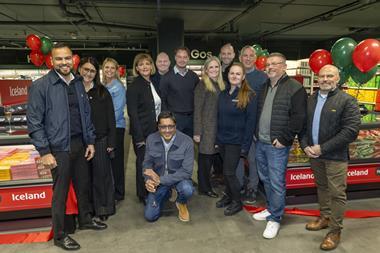The lights dim. The drums roll. The chatter drops to an excited whisper. The shortlist for this year's The Grocer Cup is announced: "Tesco's Dame Theresa Leahy, Sainsbury's Justine King and Asda's Andrea Bond. And the winner is..." Then reality dawns. We will probably never see an all-female top table for the grocery industry. In fact, in the 10 years the competition has been running, only three women have even made the shortlist. And it's getting worse. Two years ago the situation looked promising. But since The Grocer compiled a list of the top 10 women in grocery more than half have left the industry, including former joint MD of Morrisons, Marie Melnyk, Somerfield's ex-group retail director Katie Bickerstaffe, and erstwhile chief executive of Northern Foods Pat O'Driscoll. Last week, Angela Spindler - once tipped for the top job at Asda - joined the gang, resigning as MD of George Global to spend more time with her family. It leaves a dearth of women in top positions, highlighted by the dominance of men in this year's Grocer Power List 2007. Not a single woman appeared in the lists covering the multiples, suppliers, neighbourhood retailers or wholesalers. A handful made it into the influencers section, but of these only Tesco's Lucy Neville-Rolfe actually works within the industry. So where are all the women hiding? And how do they climb the ladder? Despite top names disappearing, retailers came fifth in a recent Female FTSE report compiled by Cranfield University's International Centre for Women Business Leaders. But let's not get excited - women only make up 13% of the directorate. "The number of female directors in the industry is shocking, and the average for the FTSE 100 has risen from 6% to just 10% in the past seven years," says Professor Susan Vinnicombe, director of the International Centre for Women Business Leaders. The grocery industry, and indeed the rest of the business world, must work harder to offer women equal chances from the bottom up, she says. Having recently carried out a shopfloor study among grocery retailers, Vinnicombe says women need more encouragement to move to the next level. "What struck me was the number of potential female store managers who didn't think they fitted the bill," she says. "Even though women have the right skills, they have to be encouraged to come forward. Men are much more pushy." But why should women receive more encouragement, when men are being so proactive to get ahead? "Equality is about giving everyone the same chances," insists Vinnicombe. "Women at all levels believe their managers should acknowledge they are capable. But male managers may only see men pushing themselves forward. Businesses should nurture all talent." The situation is improving, says Vinnicombe - albeit "very slowly" - and, over the past few years, the grocery industry has appointed more women as non-executive directors. Sainsbury's now has three and Tesco has two. "That changes the look at the top and sends the signal that there are opportunities out there," says Vinnicombe. Laura Wade-Gery, who is at the helm of Tesco.com, the world's biggest online grocer, is one woman who seized her opportunity. She says she has never encountered sexism and believes the male-dominated hierarchy is a "product of history". "There's nowhere in business in the UK that has the right balance of women at the top level, and grocery is no different," she says. "It is still quite recently that women wanted long-term, powerful careers. Twenty years ago few young women would have dreamed of leading a FTSE 100 company. Carry out a survey of 21-year-olds today, I'm sure you would get a different story. More women will start coming through as a result." Other countries have taken more drastic action. In Norway, publicly listed companies have to achieve a 40% quota of female directors on the board by the end of this year or face being delisted. The country now leads in terms of female directors. But Wade-Gery believes this is the wrong approach. "I'm not a believer in targets and positive discrimination - it's not helpful. Everyone should get to where they are on merit," she says. She thinks UK grocers are already aspiring to improve prospects for women, with Tesco doubling the number of female directors in its three tiers of management, and launching a network for women to share their experiences. "It's at the early stages, but we're hoping the network will help provide role models and be inclusive, from director level down to the shopfloor," says Wade-Gery. Sainsbury's has two women on the operating board - customer director Gwyn Burr and HR director Imelda Walsh. And sitting just below the executive board level, 40% of directors are female. That list includes trading director for core grocery Amanda Heffer, director of IT Angela Morrison and brand director Judith Batchelar. "We are well represented in tough operational senior roles, and two thirds of our colleagues in-store are women," says Sainsbury's director of organisational development Diana Breeze. "But we struggle in middle management. Retail has traditionally been male dominated. It's a results-driven, short-term culture and there are aspects women find difficult. They need more confidence so we have launched a female mentoring initiative to help coach female managers." A coaching scheme for the most senior women has been operating for several years. Sainsbury's chairman Sir Philip Hampton plays an active part in the FTSE 100 Cross-Company Mentoring Programme, which equips women with the knowhow to reach the boardroom. In return, leading Sainsbury's ladies get help from other FTSE 100 chairmen. At Asda, there are many women "bubbling under" board level, such as director of operations Sally Hopson and head of marketing and communications Katherine Patterson. But finance director Judith McKenna, the only woman on Asda's operational board after Spindler's departure, says there is more to do. "One of the problems women face is that the body clock starts to tick at a crucial time of career development," says McKenna. "I bend over backwards to keep the right people in my team, either by job sharing or working out hours to suit." But many women still have to make the choice between a career or family. "Organisations can be flexible, but some roles don't suit that. If a role demands long hours and weekend work, and for you to be in Aberdeen one day and London the next, it's difficult if you also want to be home with the family," McKenna says. "That's why you often see more women in high-level HR or financial posts because it's more office-based." Technology may provide a solution, however. "You can easily keep in touch via the BlackBerry if you work from home, or are on maternity leave," she says. "The other day I had a video conference call. It was just as good as having the global CFO in the room with me." The problem of inflexible working hours is particularly acute in manufacturing, which risks becoming a virtually female-free zone. "There is a low representation of senior women in manufacturing," says Kellogg's HR director Gill Lewis. "There's a reluctance by male senior representatives to be flexible, and to see that women may need a different working structure. "Many senior male executives have wives who are supportive, and can do the simple things like picking up the dry cleaning. That support at home is lacking for a lot of women, as they often look after their husbands and children. Job sharing is still alien to most companies, so women either have to leave, or stay and struggle. One way or the other, their careers stall." However, there are notable exceptions, such as Fiona Dawson, MD of snack foods at Masterfoods UK, and Fiona Kendrick, MD of Nestlé's UK Beverage Division, but manufacturing struggles to employ women - full stop. Manufacturers have to be more female-friendly or they will struggle to fill posts, says Paula Widdowson, commercial director at Improve, the food and drink sector's skills council, which has secured £500,000 government funding to help first-tier managers progress. She points to Lightbody Celebration Cakes in Hamilton, near Glasgow, which introduced "lone women" shifts to fit around school runs and "grandparent shifts" on Friday and Saturday evenings to solve recruitment problems. Innovative thinking like this is a small step towards the wholesale culture change required to nurture female talent, but it won't happen overnight. We shouldn't expect many women to make the The Grocer Cup shortlist for a few years yet.nwomen at the top Lucy Neville-Rolfe* Corporate and Legal Affairs Director, Tesco Joined Tesco in 1997 after a career as a mandarin with the Cabinet Office. She was company secretary from 2004 to 2006 and joined Tesco's board last December. Her responsibilites include EU and competition issues, and investor relations and corporate affairs policy. She is also deputy chair of the British Retail Consortium. Laura Wade-Gery CEO Tesco.com Appointed CEO of Tesco.com in January 2004. Previous positions have included group strategy director responsible for Tesco's corporate and strategic development, and targeted marketing director for Clubcard and marketing strategy. Prior to joining Tesco in 1998, Wade-Gery worked for Gemini Consulting and Kleinwort Benson in corporate finance. Gwyn Burr Customer Director, Sainsbury's Joined the operating board of Sainsbury's in 2004 and, as well as holding the customer director role, she is also a director of Sainsbury's Bank. Burr has more than 20 years experience in grocery, including five years with Nestlé Rowntree and more than 13 years with Asda, where she held various board level positions across own label, marketing and retail. Anne Murphy GENERAL MANAGER, BIRDS EYE UK Brought in by Birds Eye in February to lead its UK team, three months after Permira bought it from Unilever. She looks after a portfolio of 170 products with sales of £520m. Previously headed Procter & Gamble's customer development function, after seven years in PepsiCo's commercial division and eight years at Tesco in a variety of buying and marketing roles. Judith McKenna Chief Financial Officer, Asda Joined Asda nine years ago after working in the brewing and pub retailing industry for Carlsberg, Tetley and Allied Domecq. McKenna has held a variety of roles across finance at Asda, and she previously headed the loss prevention team. In addition to her responsibilities as CFO, she leads Asda's store development programme, which covers property acquisition, construction, refurbishment and format design. Angela Barber* Trading and marketing director, Costcutter Comes from a family of cheesemakers, Sandhams, in Lancashire, but she gained a BSc in food manufacturing and marketing and joined the Safeway graduate training scheme. After four years in grocery buying, she moved on to Nisa-Today's, rising to central buying company trading director, before moving to a strategic role at Costcutter. Fiona Dawson Managing Director, Masterfoods UK's snack business Joined Mars as a graduate trainee in 1988 and, except for a brief period with PepsiCo, has remained with the company in various roles across its European business, including general manager of the Irish business and UK sales director. She has led Masterfoods' snack business in the UK since 2005. Lizette Craig* Managing director, Botterills Convenience Stores Craig stepped up from retail director to MD of the business in 2004 when her father became chairman. Botterills has since moved from 21 to 16 in The Grocer Top 50 Independents, increasing store numbers from 39 to 45. Before joining the family business, she spent five years at accountants Scott-Moncrieff. Perween Warsi* Founder and CEO, S&A Foods Started her career making ethnic finger foods from her kitchen after she moved to the UK from India and was unimpressed with Indian food in the grocery market. She won contracts to supply chilled and frozen food to Asda and Safeway, and sold the business to Hughes Food Group in 1987. She later bought it back after the company went into receivership four years later. Di Walker Managing director, Greencore Sandwiches Has led Greencore's largest division for the past year and was MD of its chilled sauces and soups before that. Her career started at Asda and then Hazlewood Foods (now Greencore) in a director role. In 2001 she became MD for Hibernia's ready meals but returned to Greencore in 2004. Were on The Grocer's Women Top 10 List of 2005
Close menu
- Home
- Retail & Wholesale
-
Products & Suppliers
- Back to parent navigation item
- Products & Suppliers
-
Product Categories:
- Back to parent navigation item
- Product Categories:
- Alcoholic drinks
- Bakery
- Cereals & breakfast
- Cheese
- Chicken & poultry
- Chocolate
- Confectionery
- Crisps, nuts & snacks
- Dairy
- Fish
- Fresh produce
- Frozen
- Household
- Meat
- Own Label
- Sauces & condiments
- Seasonal
- Soft drinks
- Vaping
- Vegan & plant-based
- World foods
- Suppliers
- People
- Reports & Data
-
Topics A-Z
- Back to parent navigation item
- Topics A-Z
-
Popular topics:
- Back to parent navigation item
- Popular topics:
- Cost of living crisis
- Crime
- Deposit Return Schemes
- Finance
- Government & Regulation
- Health
- Inflation
- Loyalty
- Marketing
- Mergers & Acquisitions
- New Product Development
- Sourcing
- Supply chain
- Sustainability & environment
- Technology
- Ultra Processed Foods
- Vaping
- A-Z all topics
- Content by type:
- Events
- Ask iA (beta)
- Subscribe now
Sign in to comment on this article
Not logged in before? Register for FREE guest access today.
You will be able to:
- Read more stories
- Receive daily newsletters
- Comment on stories
Advert


















No comments yet